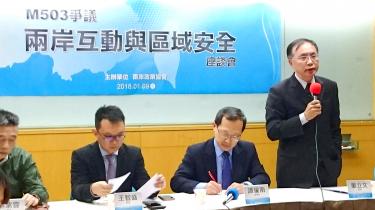China’s move to launch northbound commercial flights on the M503 route compromises the integrity of Taiwan’s airspace, and the nation should reduce cross-strait flights to force negotiations with China while increasing its defense budget and develop asymmetric defense capabilities, academics said yesterday.
China on Thursday last week unilaterally announced the launch of the M503 route, which is 7.8km from the median line of the Taiwan Strait, as well as three extension routes — W121, W122 and W123 — along the southeast coast of China.
China first introduced the M503 route in January 2015 to ease congestion in a nearby route, but its implications on Taiwan’s air defense resulted in one of the most notable cross-strait confrontations of former president Ma Ying-jeou’s (馬英九) term.
Following negotiations, southbound flights on the M503 route were launched in March 2015.
An immediate effect of Beijing’s latest move is increased difficulty in identifying military aircraft from commercial planes flying over the Strait, giving Taiwan less time to react to a military threat, Tamkang University Center of Advanced Technology executive director Su Tzu-yun (蘇紫雲) told a news conference held by the Cross-Strait Policy Association.
The Soviet Union in 1983 mistook a South Korean commercial jet that intruded into its air space for a US spy plane and shot it down, and a Malaysia Airlines plane was shot down over Ukraine in 2014, Su said.
Without communication with China, there is a possibility of misidentification, as more than 1.5 million flights traverse Taiwan’s airspace annually, he said.
Furthermore, an airstrike can be launched using a commercial flight route, as was done by Israel in Operation Entebbe in Uganda in 1976 and in Operation Opera in Iraq in 1981, Su said.
To force China into resuming negotiations with Taiwan, Taipei can reduce the number of cross-strait flights, Su said.
The M503 route’s launch is part of China’s “legal warfare,” and Taiwan needs to employ new legal narratives and drop terms formulated under the “one China” framework, Su said.
“The median line of the Taiwan Strait is a term from the [Chinese] Civil War. The narrative has to be revised using the concept of territorial waters and airspace to be convincing on an international level,” Su said.
In addition to the M503 route, “China keeps testing maritime law enforcement in Japanese, South Korean and Taiwanese waters to challenge the ‘status quo’ and create a new ‘status quo,’ which is part of China’s regional strategy,” association secretary-general Wang Zhin-sheng (王智盛) said.
China’s unilateral action provoked a rare criticism from the US Department of State, association president Stephen Tan (譚耀南) said, urging China to return to the negotiation table with Taiwan to discuss aviation safety issues.
Taiwan Thinktank consultant Tung Li-wen (董立文) urged the government to increase defense spending to 3 percent of GDP to purchase the weapons needed to build asymmetric warfare capabilities.
The Chinese aircraft carrier Liaoning sailing around Taiwan’s territorial waters is a test of China’s naval capability to break through the first island chain, and Taiwan should stay prepared, Tung said.
To maximize asymmetric defense capabilities with minimal costs, the military can develop low-cost mobile missile systems or patrol boats armed with advanced missiles, Su said, adding that some nations have developed missile systems that could be fitted on container trucks.
Source: Taipei Times - 2018/01/10





















